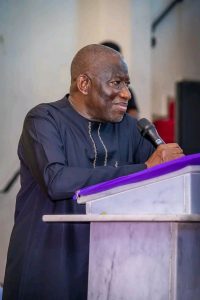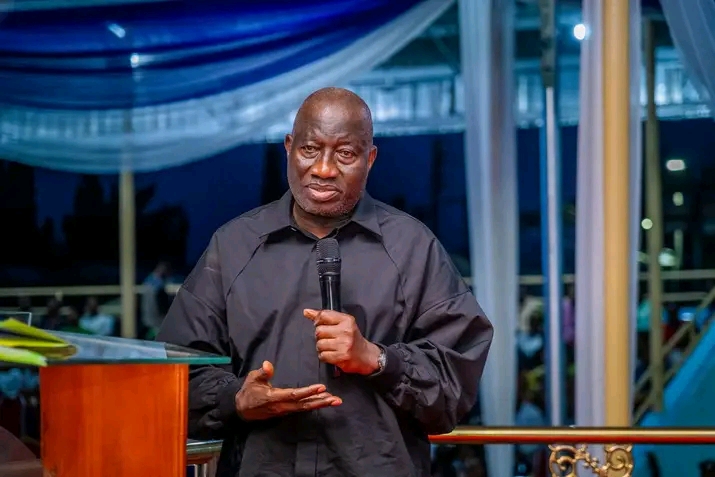Why The call for Goodluck Jonathan to contest for Nigerian presidency is a mere sham

By Ugwuzor Regal
Goodluck Ebele Jonathan, former President of the Federal Republic of Nigeria, remains a towering figure in the nation’s political narrative. From his humble beginnings to the height of political power, Jonathan’s journey is a symbol of possibility in Nigeria’s democratic experiment. However, calls for his return to the presidency have sparked intense debate, particularly regarding the legality of such a move under Nigeria’s amended 1999 Constitution.
At the center of the discussion is Section 137(3), a constitutional clause that effectively bars Jonathan from contesting for the office of President again. This article delves into Jonathan’s political journey, examines the state of Nigeria during his tenure, and explains why, constitutionally, he cannot be reelected. Just so you know, these amendment was made under during the administration of former president Muhammadu Buhari.
Jonathan’s Political Rise
Goodluck Jonathan began his political career in 1998 when he joined the People’s Democratic Party (PDP). He was elected Deputy Governor of Bayelsa State in 1999 and became Governor in 2005 following the impeachment of Governor Diepreye Alamieyeseigha.
In 2007, Jonathan was selected as Vice President to President Umaru Musa Yar’Adua. After Yar’Adua’s illness and death in 2010, Jonathan assumed the presidency. In 2011, he ran and won a full term as President, defeating Muhammadu Buhari.
His ascent was historic—Jonathan, a minority from the Niger Delta with a humble background, symbolized national unity and democratic hope. But his time in office was anything but smooth.
Nigeria Under Jonathan: Political, Economic, and Security Struggles.
1. Political Tensions and Internal Party Crisis.
Jonathan’s presidency was plagued by serious political instability. Within the PDP, cracks emerged due to alleged nepotism and poor internal democracy.
Prominent members and governors defected to the opposition APC, which ultimately contributed to his loss in the 2015 general elections.
His leadership style was seen by critics as indecisive, particularly when faced with serious national issues. The perception of weak political will affected his government’s effectiveness in pushing reforms and handling national emergencies.
2. Boko Haram and National Security Breakdown
Jonathan’s administration struggled to contain the rise of Boko Haram, a militant Islamist group based in the northeast. Attacks increased in frequency and brutality during his tenure. The 2014 kidnapping of over 270 schoolgirls in Chibok brought international attention and cast doubt on the government’s ability to protect its citizens.
Despite military efforts, the insurgency intensified. Reports of under-equipped soldiers, corruption within the military establishment, and delayed responses further eroded public confidence.
3. Economic Mismanagement and Corruption.
Economically, Nigeria under Jonathan witnessed relative GDP growth, but it was largely driven by high oil prices. The economy remained heavily reliant on petroleum exports, making it vulnerable to global oil price fluctuations.
Corruption scandals were rampant during his administration. The most notorious involved the Nigerian National Petroleum Corporation (NNPC), where billions of dollars were allegedly unaccounted for. The fuel subsidy scam and other financial mismanagements further stained the administration’s reputation.Though initiatives like the Agricultural Transformation Agenda and the YouWin youth entrepreneurship program had some impact, they were overshadowed by systemic failures.
The Legal Barrier: Section 137(3) of the Constitution
In 2018, the Nigerian National Assembly passed a constitutional amendment inserting Section 137(3) into the 1999 Constitution. It reads: “A person who was sworn-in as President to complete the term for which another person was elected as President shall not be elected to such office for more than a single term.” This provision aims to prevent anyone from occupying the presidency for more than two terms, whether by election or succession. In Jonathan’s case:- He was sworn in as President in 2010 to complete Yar’Adua’s term.- He was elected for his own full term in 2011.
By virtue of Section 137(3), Jonathan has exhausted the constitutional limit and cannot lawfully seek reelection.
Legal Interpretation and Political Context
Legal experts agree that this clause applies retroactively to cover cases like Jonathan’s. While some have argued that the law cannot apply to events before its enactment, constitutional interpretation in Nigeria typically follows purposive rather than strictly literal logic.This means courts are likely to interpret the law in a way that furthers its intent—to prevent prolonged tenure by a single individual. The clause closes the gap that previously allowed vice presidents to succeed and then run for two full terms, which could lead to over ten years in office.
A 2022 ruling by the Federal High Court in Yenagoa, which allowed Jonathan to contest, sparked controversy. Many viewed it as politically motivated and inconsistent with both the letter and spirit of the Constitution. It was not upheld at higher judicial levels.
The Political Fallout
Jonathan’s potential return has drawn mixed reactions. Some political factions, particularly within the APC, have floated his name as a “unifying candidate” or a bridge figure. Yet, pushing for his candidacy not only violates the Constitution, it also risks undermining public trust in democratic institutions.
Nigeria’s democracy, still maturing after decades of military rule, depends on the observance of term limits and the rule of law. Allowing a former president to bypass these limits would set a dangerous precedent.
In summary, Goodluck Jonathan remains a respected statesman, and his peaceful concession in 2015 was a landmark moment in Nigeria’s democratic development. However, the Constitution is clear: he cannot be reelected as President.
Section 137(3) of the 1999 Constitution as amended is designed to preserve democratic rotation, limit executive overreach, and ensure fairness in Nigeria’s highest office. While his presidency was filled with both achievements and challenges, any move to reinstate him in office would be unconstitutional and ultimately, detrimental to Nigeria’s democratic future.

